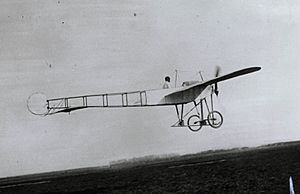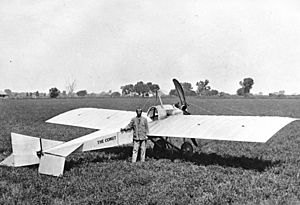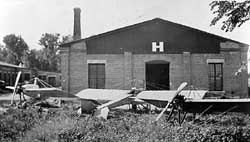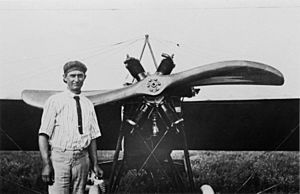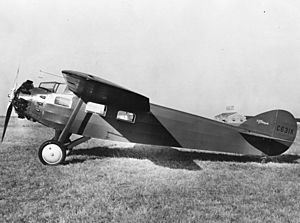Clyde Cessna facts for kids
Quick facts for kids
Clyde Cessna
|
|
|---|---|
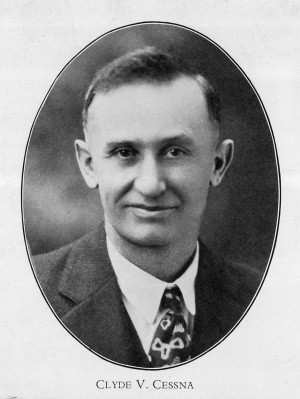
Cessna circa 1920
|
|
| Born | December 5, 1879 Hawthorne, Iowa, United States
|
| Died | November 20, 1954 (aged 74) Wichita, Kansas, United States
|
| Occupation | Aircraft designer, aviator, aviation entrepreneur |
| Known for | Cessna Aircraft founder |
| Children | Eldon Cessna |
Clyde Vernon Cessna (born December 5, 1879 – died November 20, 1954) was an American aircraft designer, pilot, and an early aviation business owner. He is most famous for starting the Cessna Aircraft Corporation. He founded this company in 1927 in Wichita, Kansas.
Contents
Clyde Cessna's Early Life and Dreams
Clyde Cessna was born on December 5, 1879, in Hawthorne, Iowa. His family moved to a farm in Rago, Kansas when he was two years old. As a boy, Clyde was very clever with machines. He taught himself how to make farm equipment better and even found new ways to farm. Later, he became a successful car dealer in Enid, Oklahoma.
How Clyde Cessna Got Into Aviation
Clyde's interest in flying began in 1910. He saw an airshow in his home state of Kansas. This show made him want to build and fly airplanes. After this, Clyde left Oklahoma. He moved to New York State. There, he worked at the Queen Aeroplane Company. This was where he first learned how airplanes were built.
Clyde Cessna's First Airplane and Flights
In 1911, Clyde decided to build his very first airplane. He called it the "Silverwing." This plane was a monoplane, meaning it had only one set of wings. It was made from wood and fabric. The engine was a changed motorboat engine. It had 40 hp (30 kW).
Challenges and Success of the Silverwing
Clyde took his new plane to the Great Salt Plains in Oklahoma to test it. His first try at flying ended in a crash. It cost $100 to fix. He tried 13 more times, but each time the plane failed. Finally, on his 13th try, the plane bounced into the air for a short time. But it crashed into some trees when he tried to turn.
After this crash, Clyde was very frustrated. He said, "I'm going to fly this thing, then I'm going to set it afire and never have another thing to do with aeroplanes!" But he kept trying. In June 1911, Clyde finally had his first successful flight! The people who had laughed at his failures now called him a "daring hero." They even nicknamed him the "Birdman of Enid."
Clyde kept teaching himself to fly. In December 1911, he made a successful 5-mile (8.0 km) flight. He also landed safely where he started. He was the first person to build and fly an airplane in the middle of the United States. This area is between the Mississippi River and the Rocky Mountains.
Clyde Cessna's Aviation Career Takes Off
After the success of the Silverwing, Clyde stopped working with cars. He wanted to focus only on aviation. Between 1912 and 1915, he built several new monoplanes. These planes were powered by a 40–60 hp engine. During this time, Clyde often flew his planes at holiday events and county fairs. This was a good way to earn money back then.
In 1916, Clyde got an empty building. He planned to build a new airplane for the 1917 airshow season. His factory also served as a flight school. He taught five students how to fly there. However, in April 1917, the United States entered World War I. This stopped all exhibition flying. With no way to earn money from flying, Clyde went back to his family farm in Rago, Kansas.
Founding Travel Air Manufacturing Company
After World War I, more people became interested in flying. In 1925, Clyde Cessna joined with Walter Beech and Lloyd Stearman. Together, they started the Travel Air Manufacturing Company in Wichita, Kansas. Clyde was the president. The company quickly became one of the top aircraft makers in the U.S. This was thanks to Clyde's smart designs. His planes set many speed and distance records.
After two years, Clyde left the company. He wanted to start his own firm. He disagreed with his partners about whether to build monoplanes (one wing set) or biplanes (two wing sets). Clyde believed in monoplanes.
Starting the Cessna Aircraft Corporation
On September 7, 1927, Clyde Cessna and another aviation businessman, Victor Roos, formed Cessna-Roos Aircraft. But Roos left the company after only one month. He sold his share back to Clyde. In December, the company changed its name to Cessna Aircraft Corporation.
In late 1927, Clyde worked hard to design and build a very good monoplane. This plane was called the AW. It was finished near the end of 1927. Clyde then designed the CW-6, which flew in 1928. Next came the DC-6, which flew in 1929. He also worked with his son, Eldon, to design and fly the CR-series racing airplanes.
Challenges During the Great Depression
Even with new successful planes, the Great Depression caused big problems. Airplane sales dropped a lot. The company had to file for bankruptcy. It closed completely in 1931. In 1934, Clyde reopened his Wichita factory. But he soon sold it to his nephews in 1936. His nephews were Dwane Wallace, an engineer, and Dwight Wallace, a lawyer.
After giving the Cessna Aircraft Corporation to his nephews, Clyde went back to farming. He used a special tractor to build ponds for local farmers. His nephew Dwane asked him to stay involved with the company. Clyde agreed, but he mostly helped in a formal way and did not handle the daily business.
Clyde Cessna's Legacy
Clyde Cessna passed away on November 20, 1954, at age 74 in Wichita, Kansas.
He was honored after his death for his contributions to aviation. In 1978, he was added to the National Aviation Hall of Fame. In 1983, he joined the International Air & Space Hall of Fame. In 2013, Flying magazine listed him as number 27 on their list of the 51 Heroes of Aviation. The airport in Kingman, Kansas is named the Kingman Airport – Clyde Cessna Field in his honor.
Images for kids
 | Kyle Baker |
 | Joseph Yoakum |
 | Laura Wheeler Waring |
 | Henry Ossawa Tanner |


